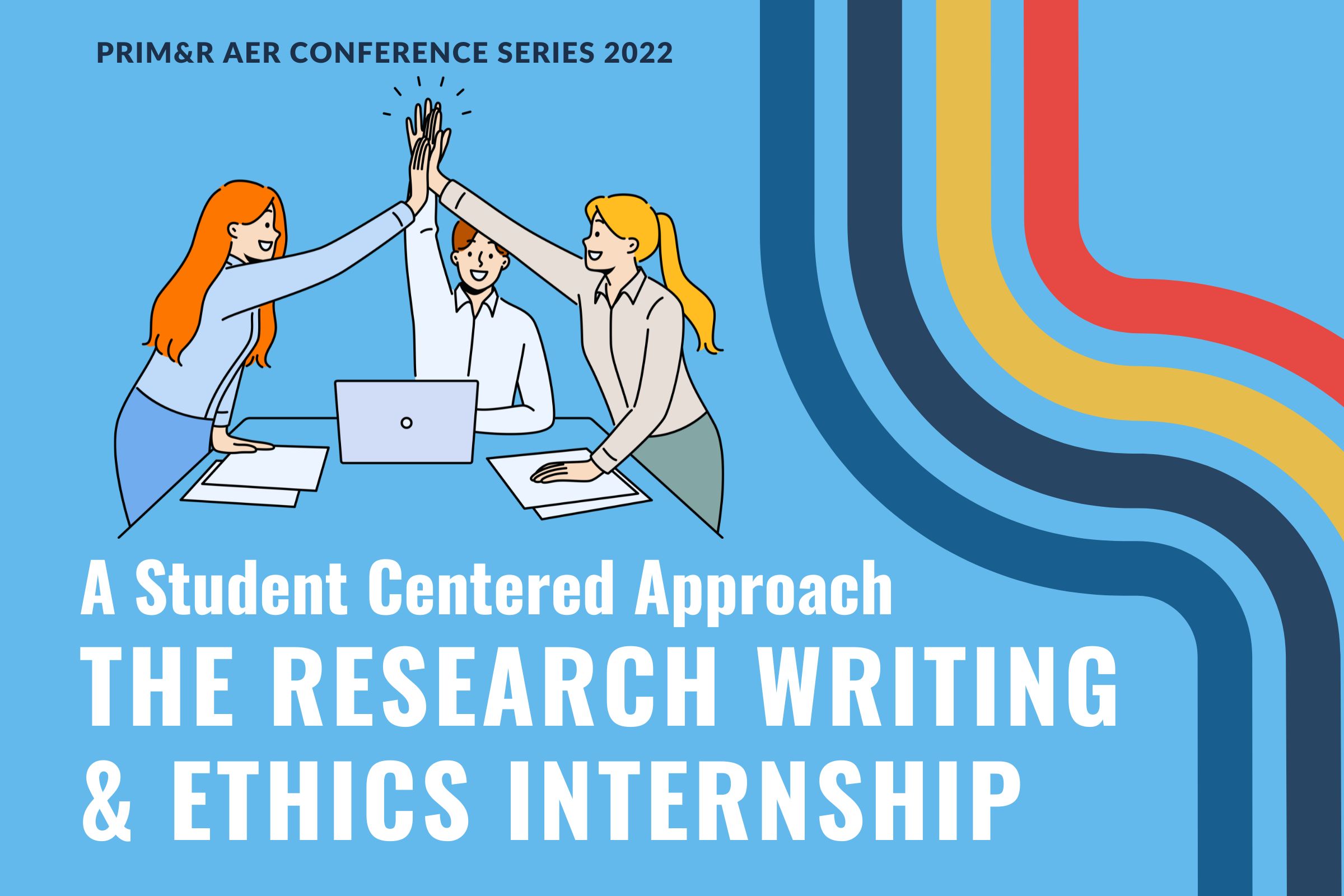The 2022 Advancing Ethical Research (AER22) Virtual conference is hosted by Public Responsibility in Medicine and Research (PRIM&R) “works to ensure the highest ethical standards in research by providing education and other professional resources to the research and research oversight community.” The AER22 conference provided valuable networking opportunities for research institutions and regulatory administrators. Additionally, institutions presented posters and informational sessions on topics related to research ethics in human subjects research.
Myra Luna Lucero, Ed.D., Kailee Kodama Muscente, Ed.M., & Karen Froud, Ph.D., delivered a poster presentation entitled “A Student-Centered Approach: The Research Writing & Ethics Internship” which outlined the development of the Research Writing & Ethics Internship including intern:
- Recruitment, onboarding, mentoring, and supervision
- Project examples
- Time and task tracking
The ever-changing research landscape requires Institutional Review Board (IRB) administrators to maintain updated research compliance knowledge. A “Lunch and Learn” (L&L) series provides a pathway for learning in an hourly interdepartmental meeting for staff. Additionally, L&L sessions can bridge learning gaps, provide opportunities for mentorship, and contribute to a knowledge repository to revisit. Session hosts can structure an L&L as informal or formal learning, provide guides, resources, or pre-session activities to reinforce the office culture and streamline knowledge sharing. For example, the Teachers College (TC) IRB structured L&L’s each month, with pre-session work including protocol reviews, professional development videos, and discussion questions. L&L structures are flexible, and administrators can adapt the format to suit the office dynamic and culture. This program evaluation explores how we built a knowledge repository through our shared community experience and fostered workplace relationships in a virtual environment using a L&L format.
Human subjects research may overwhelm novice student researchers which can exhaust resources, their faculty mentors, and IRB staff. Novice researchers will inevitably connect with their peers about their initial human subjects research questions. Research compliance specialists can harness this typical flow of communication and train students as peer leaders with specific human subjects research knowledge to support the overall research community. This line of thinking helped us create the “Research Writing & Ethics Internship."
Led by the Institutional Review Board (IRB) and in collaboration with the Graduate Writing Center, Graduate Student Life, and TC NEXT, our semester-long, part-time paid student internship aimed to develop professional competencies in research with human subjects. Student interns participated in this program to accomplish tasks, develop professional skills, use knowledge, collaborate, define measurable goals, and network with their peers to support research compliance with internship goals that include:
- Accomplish human subjects research task
- Develop professional competencies for career success
- Use knowledge to develop research, writing and ethics skills
- Collaborate with a team
- Define specific and measurable goals for research
- Network with departments and colleagues

Lunch and Learn Aspects
(1) clear pre-session/session expectations (e.g., topic and meeting format); (2) timely and relevant topics (e.g., current event, protocol, or office topic) with time to reflect; (3) manageable expectations (e.g., no more than one hour pre-session activity, no more than one hour meeting); and (4) inclusive invitations (e.g., as appropriate invite staff, student employees, board members, & knowledge experts to contribute to the discussion). Leading a L&L should not distract an administrator from their typical daily tasks, but instead contribute to what the administrator may be doing already. For example, an administrator may need to create a guide to support students engaged in human subjects research. An L&L session may be themed, “Student Researchers: Challenges and Opportunities,” and may include guides from other institutions, or journal articles covering this topic. Ideally, at the end of the L&L, staff will have a greater understanding of the topic, and have contributed ideas on how to accomplish the task or project.
Discussion
This program evaluation noted a few of the L&L topics, including, but not limited to:
- Health Insurance Portability and Accountability Act (HIPAA)
- Data protections
- Research in the pandemic
- Research on diverse and under served populations
- Incidents of non-compliance, and secondary data
- Parent permission, particularly for LGBTQIA+ youth
The program evaluation included an analysis of a “satisfaction survey” exploring if staff's sense of connection and belonging was impacted by the L&L sessions. The survey also included suggestions for improving L&L sessions.
L&L sessions totaled ten hours and roughly an additional ten hours of prep work over seven months. The evaluation revealed two L&L priorities: (1) research compliance content sharing and
(2) relationship building. Staff reported appreciating a space to process “gray areas" within research compliance and interactions that “help us get to know one another." Staff also provided feedback for L&L sessions, including an opportunity to vote on content for the L&L sessions. The program evaluation revealed limitations to L&L: (1) as a new initiative there were not initial clear curricula; (2) topics were chosen on preference, not group consensus; (3) pre-session activities required prior organization to save time. Future assessments of L&L’s success should include data on the asynchronous hours for pre-session activities.
L&L can help administrators prioritize learning, improve staff engagement and interaction, and build departmental relationships and institutional knowledge. Key to an L&L’s success is developing clear expectations and reasonable time management to complete all learning activities.
For resources, contact IRB@tc.edu with a subject line of "L&L Sample Documents."
